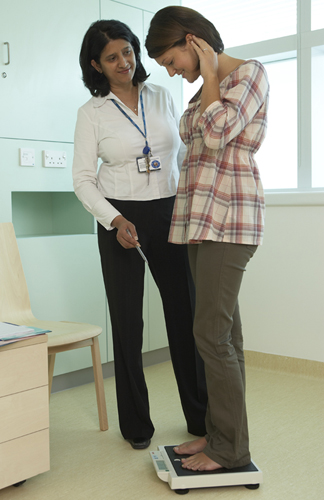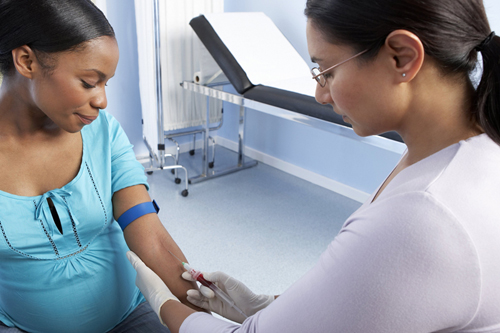You are 9 Weeks and 3 Days 214 days to go…
You don’t need to shop for a maternity wardrobe just yet, but it might be time to purchase some bigger bras.
Your baby today
The shoulders, elbows, and wrists are flexed leaving the hands
in front of the face. It’s far too early to be aware of them but several
fetal movements will start to become apparent on an ultrasound scan at
this stage.

If your normal bras are starting to feel a little uncomfortable,
it’s time to go for a fitting. If you have not done so already, get
yourself measured professionally. Wearing a good and supportive bra
during pregnancy is essential to prevent backaches and sagging breasts.
Whenever you feel you need
a new bra, get measured properly to ensure that you’re wearing the
right size. Although your breasts may be growing very quickly at this
time, you should find that by the end of the first trimester the growth
has stabilized. There is then unlikely to be much more breast growth
until you’re in your third trimester and after the baby is born.
Wearing underwire
bras during pregnancy is not recommended because they can dig into the
developing breast tissue and damage it, and may even cause problems with
milk production; the wires digging into the skin can also be
uncomfortable. Non-underwire bras with wide supportive straps, such as
sports bras, are good in pregnancy.
Look for maternity bras
that double as nursing bras, which unhook at the front, for after the
birth. There are some very pretty and feminine styles available.

Pica means craving inedible substances and comes from the Latin for magpie, a bird that scavenges indiscriminately.
If you like crunching
coal or sniffing your hot-water bottle, you have pica. While licking the
toothpaste is fairly harmless, you should resist eating toxic items
such as chalk, glue, and soap. Pica could be a sign that your diet is
deficient in some way, so seek advice. Taking an iron or vitamin
supplement could help.
… Nutrition
Vegan needs
If you are a vegan and pregnant,
you may have to work a little harder than most women to get the right
nutrients. You need to make sure you obtain adequate B12 and since there
are no natural sources of vitamin B12, it needs to be obtained from
fortified foods such as:
You also need zinc,
an important nutrient in pregnancy—necessary for growth and energy and
supporting the immune system. Zinc can be found in the following foods:
Like most vegans, you probably already eat many of these foods.
Your First Prenatal Visit
Your first prenatal
appointment usually takes place between 8 and 12 weeks. At this visit,
your prenatal records will be started and you will have a chance to
discuss any concerns or issues with your doctor.
At your initial visit,
you will meet your doctor who will be handling your care. She will ask
you questions about your past and present health and about medical
conditions in your family. You will also have a physical examination and
blood and urine tests. Your due date will be estimated based on the
date of your last menstrual period (see Take folic acid).
Medical history
The doctor will take a
full medical history to check if there are any health problems, which
will help her identify your pregnancy as high or low risk.
If there is a problem,
she will explain how this could affect your pregnancy. If you have an
existing condition, she’ll discuss how your pregnancy may affect your
health and if your treatment needs to change. Inform the doctor of any
medications you’re taking; certain ones, such as some of those for high
blood pressure, may need to be changed .
Family history
The doctor will ask
about any health problems in your own and your partner’s family. This is
important because some conditions can be passed on, and testing may be
available to identify if your baby is affected. You will also be asked
possibly embarrassing, but important, questions about sexually
transmitted diseases, past drug use, and terminations. It’s important
that you reveal your history so that your doctor can identify and
prevent potential problems. If your partner is unaware of a past event
and you feel sensitive about this, arrange to tell the doctor when he
isn’t present.
Physical examination
You will have a physical
checkup, although the nature of this varies from doctor to doctor. The
examination may include a check of your skin, thyroid, heart, lungs,
breasts, abdomen, and limbs.
Height and weight
A baseline height and
weight measurement will be taken to calculate your body mass index
(BMI). A low or high BMI increases your risk of complications and your
doctor may monitor your weight gain.
A baseline weight measurement is taken at your first appointment.

Blood pressure
A baseline
blood pressure measurement will be taken at your first visit. Blood
pressure usually goes down at the start of pregnancy, rises around week
26, and by the 32nd week, returns to its original prepregnancy value. So
if your initial blood pressure measurements are in the normal-to-high
range, they are likely to rise to above normal during the third
trimester and need treatment.
Your blood pressure will be recorded at each appointment and any changes will be investigated.

Routine blood tests
You will be asked to
provide a sample of your blood, which will be tested to screen for
several conditions and to determine your blood group and immunity to
certain conditions.
Complete blood count
This is a screening
for anemia, which occurs most commonly from low levels of iron in the
blood. If you’re anemic, you’ll be advised to eat iron-rich foods and may need an iron supplement.
Blood group
This determines your blood group (A, B, O, or AB) and if you’re Rhesus positive (Rh+) or Rhesus negative (Rh-).
If you’re Rh- and your baby is Rh+ you could develop antibodies against
your baby’s blood that cause anemia in your baby. Your immune system is
unlikely to come into contact with your baby’s until labor so this
isn’t usually a problem with first pregnancies. To prevent problems in
subsequent pregnancies, Rh-women are routinely given Rh immune-globulin
injections at 28 weeks and within 72 hours of giving birth to stop
antibodies from forming. It’s also given after any procedure such as amniocentesis, or if you have vaginal bleeding.
A blood sample identifies your blood group and tests for a range of conditions.

Rubella
This blood test
checks your immunity to rubella. Rubella infection in pregnancy can
cause serious problems for the baby. If you aren’t immune, you can’t be
vaccinated in pregnancy, but will usually be vaccinated after delivery
so you’re protected in future pregnancies.
Hepatitis B
This test identifies
women who are actively infected with hepatitis B, a viral liver disease
that can be passed to the baby during pregnancy and labor.
Syphilis
The blood test checks if
you have ever had syphilis. Active syphilis can cross the placenta and
cause serious complications in your baby.
HIV
You will
be offered a test for human immunodeficiency virus (HIV). If you have
HIV, you can reduce the chances of passing this on to your baby by
taking antiviral agents and not breast-feeding.
Sickle-cell disease or thalassemia
You are tested to see if
you are a carrier of sickle-cell disease or thalassemia, genetic
disorders that affect the oxygen-carrying ability of red blood cells.
These are most common in people of African, Hispanic, or Mediterranean
origins. If you are found to be a carrier, your partner will need to be
tested; if he too is a carrier there is a chance that your baby could
develop the disease.
Routine urine tests
Your urine is checked
for protein, which may indicate infection or, less commonly, kidney
disease. If protein is found, a urine sample is sent to the laboratory
for culture to look for bacteria. Around 15 percent of women have
bacteria, but no signs of a urinary tract infection. If bacteria is
found, you may need antibiotics to stop kidney infection, which is more
common in pregnancy and can cause complications. If no infection is
found, further tests will check your kidney function.
Getting your results
If all is well, you will
be given the results of your blood test at your next prenatal visit. If
there is any concern, the doctor will contact you earlier to discuss the
results.
Future prenatal care
What is coming up
If your pregnancy is low risk, you will have around 14 prenatal appointments.
They’ll start out at 4-week intervals and gradually increase to weekly
by your third trimester. After the first appointment, your next prenatal
visit will be 4 weeks later.
At each appointment,
your doctor will do routine checkups to assess both your health and the
well-being of your baby. These checkups will include taking your blood
pressure and checking your urine for protein, the presence of which
could indicate an infection that needs treating or, later in pregnancy, preeclampsia. You will be weighed regularly and given guidance if you’re putting on too much or too little weight.
After around 12
weeks, the doctor will start to listen to your baby’s heartbeat with an
instrument known as a handheld sonic aid. From around 20 weeks, your
doctor will measure your abdomen to monitor the growth of your baby.
Additional tests
Extra screening
Some additional tests may be offered depending on your doctor and your individual circumstances.
Cervical cultures:
Because
both chlamydia and gonorrhea can be symptom free, it’s worth getting
tested if you think you’re at risk, since these can cause problems if
passed on to your baby.
Hepatitis C:
You may be offered screening for this condition if your history puts you at a higher risk.
Varicella:
If
you’re unsure whether you’ve had chickenpox (varicella), a test can
confirm this. If you’re not immune and are exposed to the infection
during pregnancy, treatment can prevent severe chickenpox in pregnancy.
Toxoplasmosis:
This
identifies if you have ever been infected with toxoplasmosis. Past
infection protects you from infection in pregnancy, which could harm
your baby.